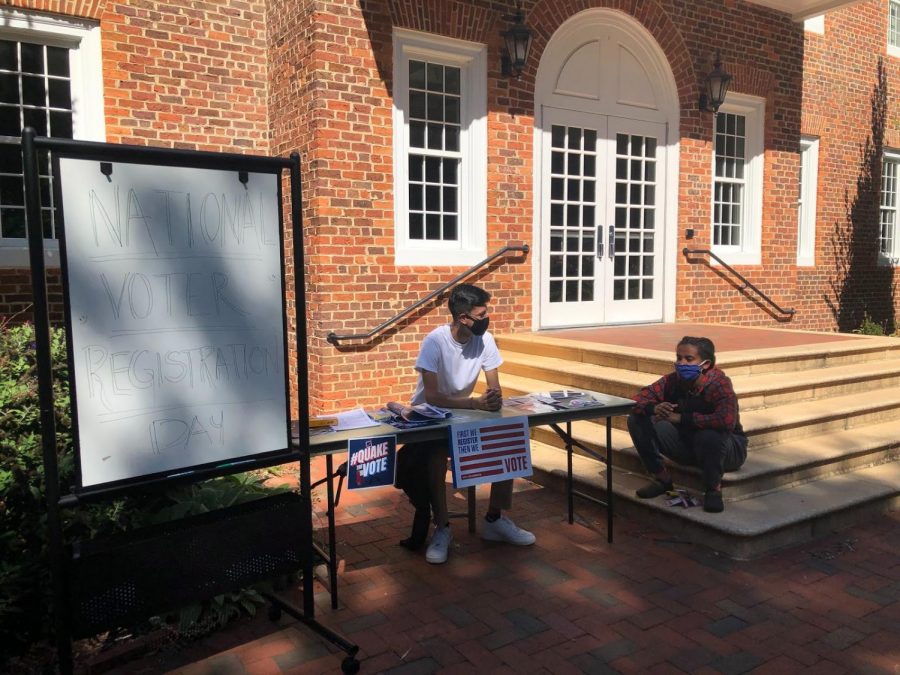Bonner Scholars work to turn around low voter engagement among Guilford College students
Kalkidan Miller and Isaac Collins wait tables outside Founders Hall to help students register to vote.
The voter engagement at Guilford College is low, and the Bonner Scholars program wants to do something about it. In one of a series of attempts to get more students at Guilford College to go out and vote, the Bonner Scholars program hosted several registration stations around campus on National Voter Registration Day, Sept. 22.
Both at the Founders Hall gazebo and near the Misty Rocks, volunteers helped students register and handed out flyers as well as stickers to those who did. Many Guilford students, however, were not too enthusiastic about participating.
According to volunteer Kalkidan Miller, many students shrugged off the offer to register to vote, saying they had already done so or would do it later, in an effort to avoid stopping and filling out paperwork.
Another volunteer in the same location, Issac Collins, noted that only two to three people had actually gone through with registering over the course of an hour, while a third student volunteer at Misty Rocks noted that about 15 people registered over the course of the four hour event.
Collins said that their aim is to get over half of the Guilford population to vote, though this is a step up from previous years.
According to the National Study of Learning, Voting, and Engagement (NSLVE), 46.8% of students at Guilford voted in 2016, though they were only 3.6% down from the national average at college institutions.
Meagan McNeely, the Bonner Scholars program coordinator, seeks to solve this problem.
“You go to your English class, and it’s like, only half of your English class is voting,” said McNeely, who is passionate about voting.
McNeely said that students may not fully understand how much their vote counts. For example, many students who may have voted for Democratic candidate Hillary Clinton neglected voting in 2016 because they were confident that she would win. This did not happen.
In another example, McNeely highlighted how in the 2008 presidential election predominantly between Barack Obama and John McCain, Obama won North Carolina by a stunningly slim margin of five votes per precinct.
McNeely discussed how important it is for students to take advantage of their right to vote, especially “persons of color and women,” who relatively have not had this right for very long. As a result, a variety of functions are being carried out to raise the voter engagement levels.
To eliminate the problem of students not voting because they do not have a ride, there will be shuttles transporting students back and forth to voting centers on Oct. 23 for early voting, as well as on election day itself. They will have “no excuse not to vote,” said McNeely, as volunteers will be there “9 to 5.”
McNeely said a variety of events are also being planned. Various clubs will have watch parties to view the presidential and vice presidential debates. The Bonner Scholars program will show students sneak peeks of their ballots during National Voter Education Week, as a means to get students to do research on the candidates and vote being informed.
As a last hurrah, the Bonner Scholars program will be coordinating with the Office of Student Leadership and Engagement as well as the Center of Principal Problem Solving to throw a party on election night on the quad, for students to hang out, eat snacks and watch the election results come in.
“Having a voice in our democratic process” is important to the Bonner Scholars, and they believe it should be important to each and every student at Guilford College.
The NSLVE will collect voting data at Guilford College to be published later on in the year. Only time will display the results of the Bonner Scholar program’s passionate endeavors.







